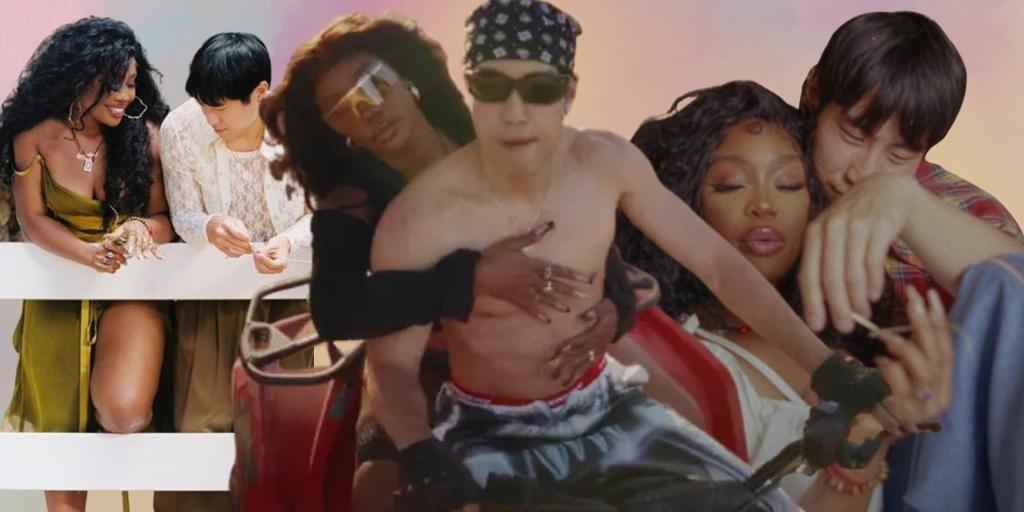SZA’s latest single “Snooze” was released at the end of August, and the fans have gone bonkers over. Part of it is because she featured celebrity men as her “video vixens,” as it were, including Justin Beiber, Benny Blanco and Woody McClain. But a large contingent of fans had the most to say about her inclusion of Beef star Young Mazino as one of the celeb men in her music video harem.
One commenter wrote, “[A]s a 2nd generation Asian man, it’s incredible to feel and BE represented. Seeing Young play the role of a ‘handsome,’ ‘resilient’ male figure was something I rarely got to experience in media growing up. Thank you SZA, thank you Young. This just made my days.”
Another commenter wrote, “That Asian man was fooooine! I love how you got different men from all walks of lives, backgrounds and race. Your song teaches self love which is why I’ve always fell in love with your music in the first place. Thank you Sza.”
“As an Asian woman, I’m so glad to see an Asian man be cast,” wrote another YouTube commenter. “We really have the most wonderful men, but they’ve been portrayed with such negative stereotypes in media for the longest time that even our own people [have] fallen into the trap of believing all the negativity and feeling insecure about dating them. Glad to see more artists showing our men some love.
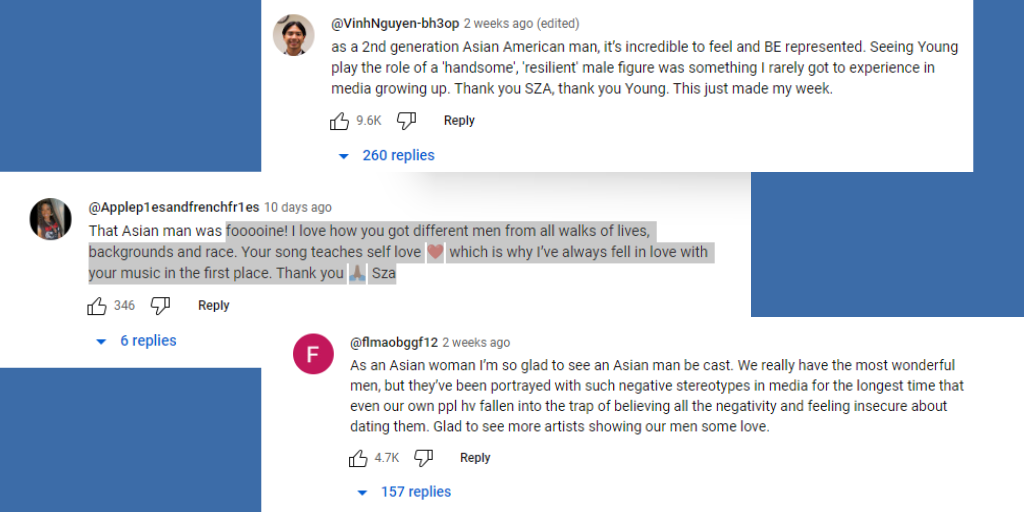
This is the second time SZA has featured an Asian man in her videos. Two years ago, SZA and Doja Cat released “Kiss Me More,” featuring Grey’s Anatomy star and model Alex Landi as an astronaut who lands on Planet Her.
Her Campus writers Jade Zuniga and Deedee Plata wrote how the music video came at the right time to combat not only the rise in COVID-related hate crimes against Asians (which they themselves admitted could be seen as a reach), but, more to the point, takes a stab at combatting stereotypes against Asian men.
“Iconic movies that used Asian characters as jokes and reinforcing negative stereotypes about Asian men” include Breakfast at TIffany’s and 16 Candles, but “[b]y putting Alex Landi as the face of the video, one that oozes sex appeal, it helps combat the reinforced idea that Asian men aren’t attractive, because let’s be honest, Alex Landi is very attractive,” they wrote.
So, with all of this said, now that we’re nearing 2024, can we finally put the discussion about Asian men’s attractiveness to rest?
Granted, maybe I’m not the one to talk about this, since I’m a Black woman. However, I feel like what I’m actually asking is not for the discussion about stereotypes to be over, but for the discussion to become deeper or more meaningful. I feel like addressing Asian men’s level of attractiveness is just the tip of the iceberg when it comes to the real inequalities facing Asian men, women and people of color in general.
The topic surrounding Asian male stereotypes has always been an issue in entertainment for decades, but it only recently caught fire in its current iteration around 2014 and 2015, when talks about diversity and inclusion in entertainment as a whole started taking off. Steve Harvey’s 2017 comments on his talk show about Asian men being unattractive also didn’t help matters. Many took Harvey to task about what he said, with Fresh Off the Boat‘s Eddie Huang writing in the New York Times (as reported by Variety):
“He speaks openly about issues facing the black community, he is a man of God, and he has a huge platform to speak from. Unfortunately, he’s also the type of guy who orders Krug champagne for himself and Cook’s for every one else. For his own personal profit, he’s willing to perpetuate the emasculation of Asian men regardless of how hypocritical it is.”
Both Harvey and his spokesperson put out statements about the joke, with the spokesperson saying, “Steve Harvey was poking fun at unusual book titles in a comedic segment from Friday’s show. His comments were never meant to demean the Asian community and the show sincerely apologizes to anyone who was offended.”
Harvey himself also wrote in a Notes app apology on Twitter, “I offer my humblest apology for offending anyone, particularly those in the Asian community, last week [as of 2017]. It was not my intention and the humor was not meant with any malice or disrespect whatsoever.”
Wanted to share this today. pic.twitter.com/mpKGBZic5k
— Steve Harvey (@IAmSteveHarvey) January 17, 2017
With Crazy Rich Asians coming out the next year, featuring a plethora of attractive Asian men, the topic about hot Asian men was at a fever pitch. The Cut‘s Lisa Ryan wrote at the time how the film “offers up two hours of absolutely unparalleled hot male eye candy–from Hot Shirtless Man Talking About Feeling With His Hot Shirtless Friend to Hot Shirtless Man Coming Out of the Shower and of course, who could forget Hot Shirtless Man Snuggling?”
Ryan, like a lot of the internet at the time, gave thirsty props to Henry Golding, Pierre Png, Chris Pang, Remy Hii, Ronny Chieng and Jimmy O. Yang and many praised the film for combatting Asian male stereotypes and showing how false they are. With almost every film or TV show after that featuring a conventionally attractive Asian man, there’s been tons to say about how that piece of media is dismantling those stereotypes, and rightfully so.
However, with the current anxiety about Asian men’s attractiveness nearing a decade within ongoing conversations about racial diversity and inclusion, I feel like it’s time to ask for the anxiety to evolve into clarity. Or at the very least, for the discussion about Asian men to evolve into something with more tooth behind it. Yes, Asian men, like all men, are attractive and can be seen as such. Now what?
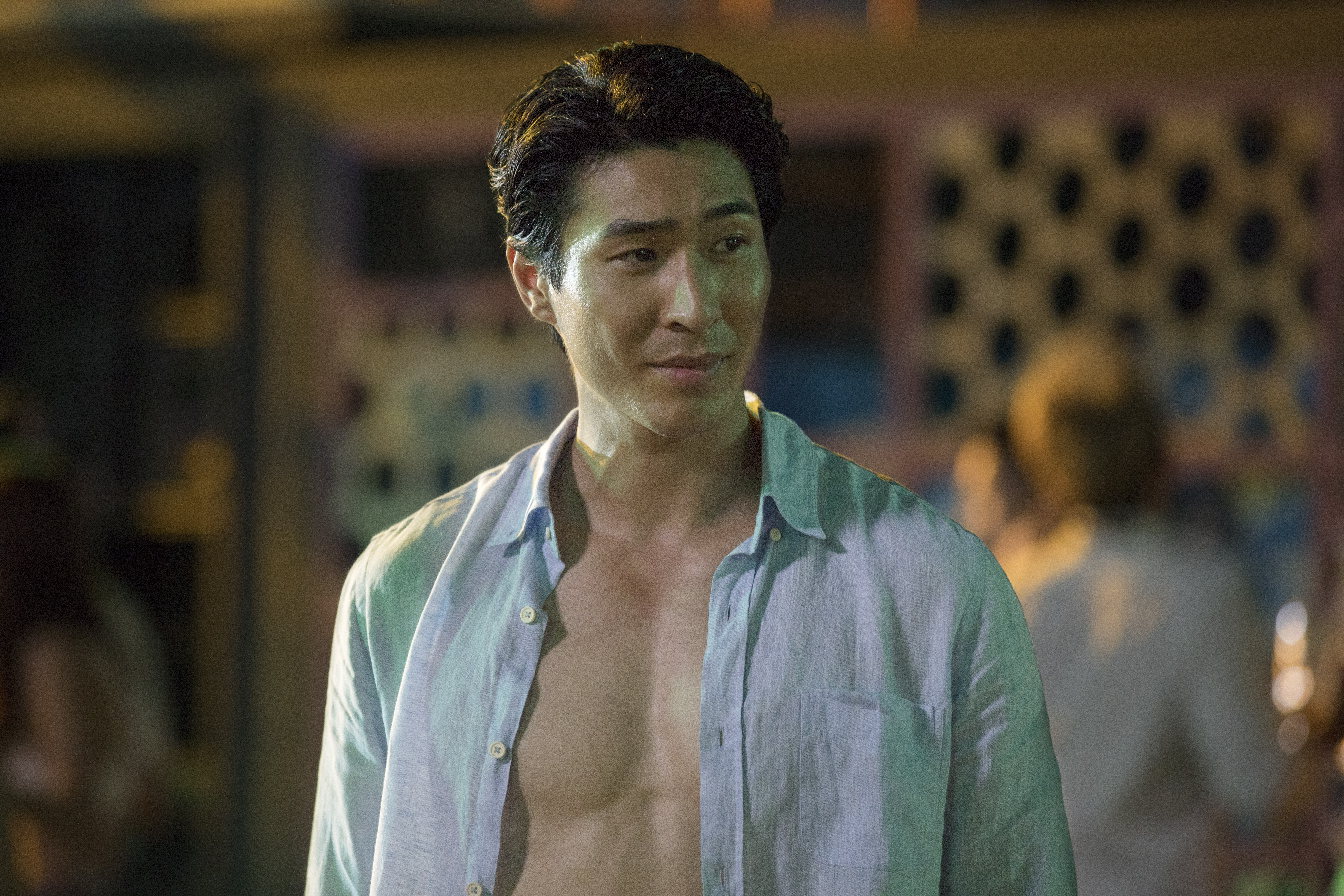
Now, of course, there’s something to be said about how the pervasive stereotype has blocked Asian men from getting leading romantic roles in film and television. This is a valid conversation to have. We can also talk about how that stereotype has harmed Asian men’s self-esteem growing up, which can affect a lot of areas of life. I’m not negating all of the seriousness of the stereotype. With that said, it seems like it would make a lot more sense to focus on those serious aspects rather than us simply asking if our eyes and brain can judge if someone’s got a symmetrical face.
What I’d love to see are more articles that do less telling us who’s hot and more about getting into the real meat and potatoes of where the stereotype comes from. And with most things, it stems from white supremacy. While White supremacist thought had people believe Black and Native American people were hypersexual and that Black and Native American men wanted to steal white women, Asian men were perpetually shown as a scourge invading the nation. This runs counter to the real reason Asian men were “invited” into the country at the time–to become cheap labor in place of the emancipated slaves who could no longer be made to work as an embattled caste. Also during this time, the 1800s, the industrial revolution was opening up opportunities for many beyond the country’s borders to find work and make a living, making immigration an attractive option for those hoping to turn their luck around.
To control this influx of Asian men, something they probably felt was getting out of their control once those men started advocating for American rights, then the “Yellow Peril” narratives start popping up, such as Asians being out to take white people’s jobs, or (as it always seems to fall back to), steal and bewitch white women from their pure, white American families. Also at this time was the belief that Asian men were ugly, scary devils from the Far East who wanted to infiltrate America. Thus, the “threat” had to be “neutralized” through racism, scare tactics, policy, and emasculation.
As Michael Park wrote in his 2013 paper for The Modern American, “Asian American Masculinity Eclipsed: A Legal and Historical Perspective of Emasculation Through U.S. Immigration Practices,” “In many Asian countries, there was little reason, need, or desire to immigrate to the United States, even though the era before the mid-1800s was a time of open immigration for Asian immigrants into America. Asian immigration (particularly Chinese immigration), began during a period when the European powers and the United States were experiencing major social and economic transformations. The rapid expansion of industrial capitalism in America during the mid-1800s created a high demand for cheap labor.”
“Driven by a rice shortage, the damaging effects of the Taiping Rebellion and China’s loss to Britain in the Opium Wars, Chinese laborers began to arrive in America during the 1840s. The Chinese were officially welcomed when they first arrived in America. The simultaneous opening of Asia and the American West, along with the new gold rush, created a demand for “coolie,” or (unskilled and cheap) Chinese labor,” he wrote. “Even John McDougall, the governor of California in 1852, wanted to provide land grants as incentives for the Chinese to settle on America’s new frontier…By 1882, almost 300,000 Chinese laborers had entered and worked on the West Coast.”
Anti-Asian sentiment soon started building as more Chinese settled, with Park writing, “This anti-Asian sentiment, fueled by the white majority’s fear of losing jobs to aliens, prompted demands for restrictive federal immigration laws and practices. These same laws and practices would not only exclude Asians from the American polity, but would simultaneously help create a racialization and female gendering of the Asian male.”
The paper goes on to argue that since one of the early defining attributes of American citizenship depended upon a recognition of a male household, Asian immigrants and their male descendants were in effect denied their masculinity until 1943, when the Magnuson Act repealed the Immigration Exclusion Act.
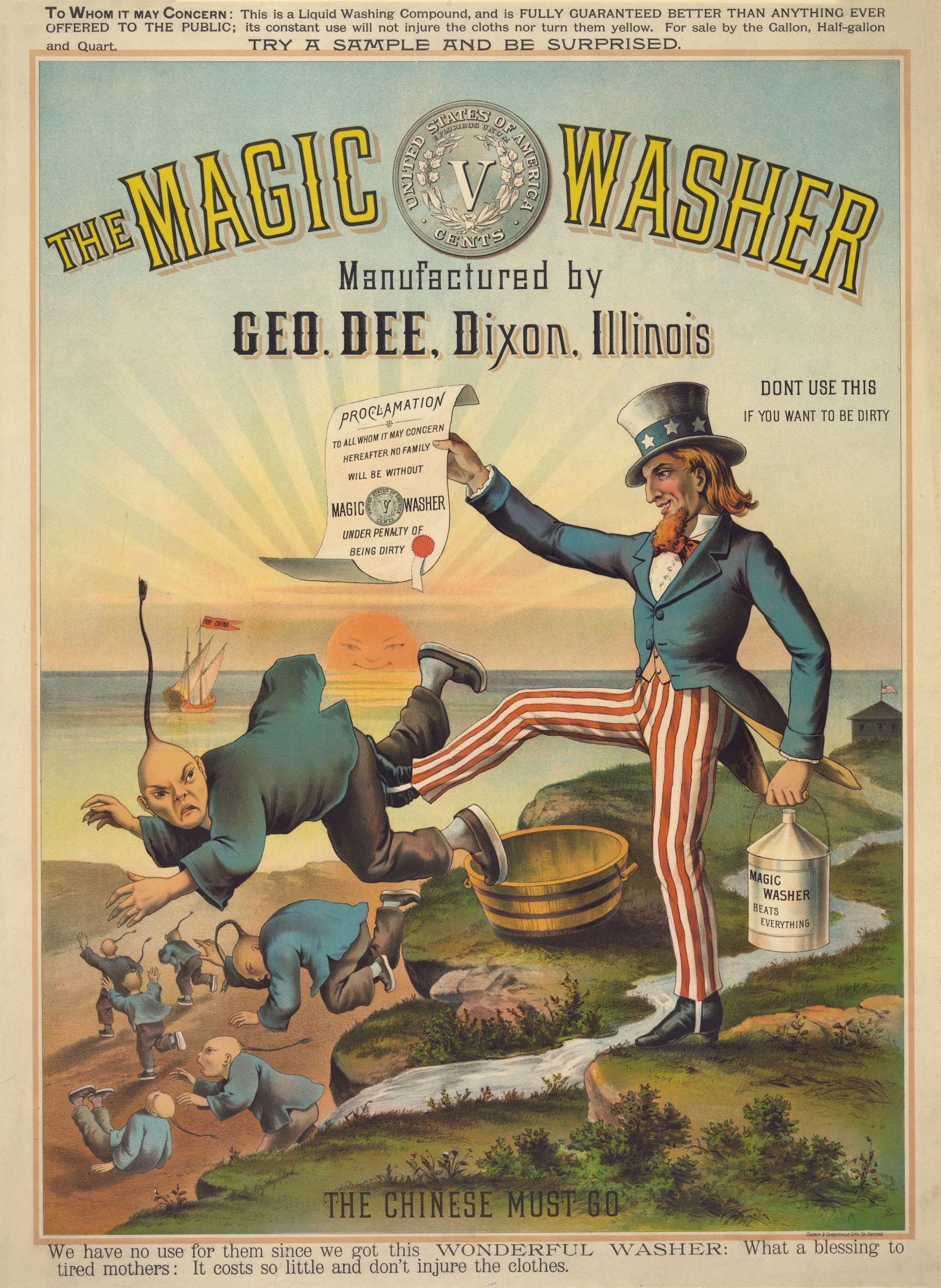
“Until 1870, United States citizen ship was granted only to white male persons. In 1870, African Americans could become naturalized, yet Asians were deliberately barred from naturalization until the Magnuson Act repealed immigration exclusion in 1943. After 1943 however, as the state extended citizenship to Asian men, it could be said that the state had formally designated them as ‘male,'” wrote Park. “However, the enfranchisement of Asian immigrants into citizenship was limited to an annual quote of only 105 immigrants…Facing a very low annual quota of 105, non-naturalized Chinese immigrants were therefore severely limited in establishing family formations and taking part in the naturalization process.”
National and state discrimination contributed towards the idea of a “feminized” or “asexual” (in the most colloquial use of the term) Asian male, which included the barring of Chinese immigrants’ wives from entering the country prior to the 1940s, creating majority male communities of Chinese men. Marrying white women was also out of the question. This led many Chinese men to establish themselves in other ethnic communities and marry Black and Brown women, since it wouldn’t have been illegal to do so.
But just as prevalent were the amount of bachelor communities of Chinese men who were essentially prohibited by law from creating families and establishing themselves as men. Eventually, this created a long-standing view that Chinese men were more female or even queer in nature, with Park’s source Gary Okihiro writing how “work such as cooking, cleaning and washing were open to Chinese men, who, according to the prevalent idea, were lesser men belonging to a feminized race.”
This is the conversation we really need to have. It’s easy to end the discussion about Asian masculinity at “Henry Golding sure is hot!” But that doesn’t actually solve anything. Being hot in and of itself and being able to bag women isn’t actually social justice change. Advocating for people to treat you with humanity and realize that you, along with any other man, should be afforded the opportunity to live your life with your humanity recognized, actually is.
I’ll end this post with a portion of my February Shadow and Act interview with Randall Park, who recently released his directorial debut about Asian American male identity, Shortcomings. I directly asked him what he thought about the conversation surrounding male attractiveness, and he said that he thought a lot of the conversation amounted to nothing.
“I try not to think of it too much because it almost feels like one of those things that you almost don’t want to validate the question by putting energy into it, you know? [I’m] like, ‘Yeah, I’m just gonna go about my life and not think about it too much.’ But yeah, I don’t know. I just feel like, to me, it’s like beauty is everywhere.” he said at the time. “Yeah, you could show photos of people and say, ‘Oh yeah, they’re hot,’ therefore that makes them hot. But to me, it’s so much more interesting and hotter to learn about a person and to identify with a person on a deep level and the attractiveness of that person becomes so much more palpable. And I feel like that happens when you tell great stories. That’s what happens when you tell stories of complex people regardless of what they look like. And that happens in one’s everyday life, just being out and about and talking to people and being genuine and authentic as possible.”
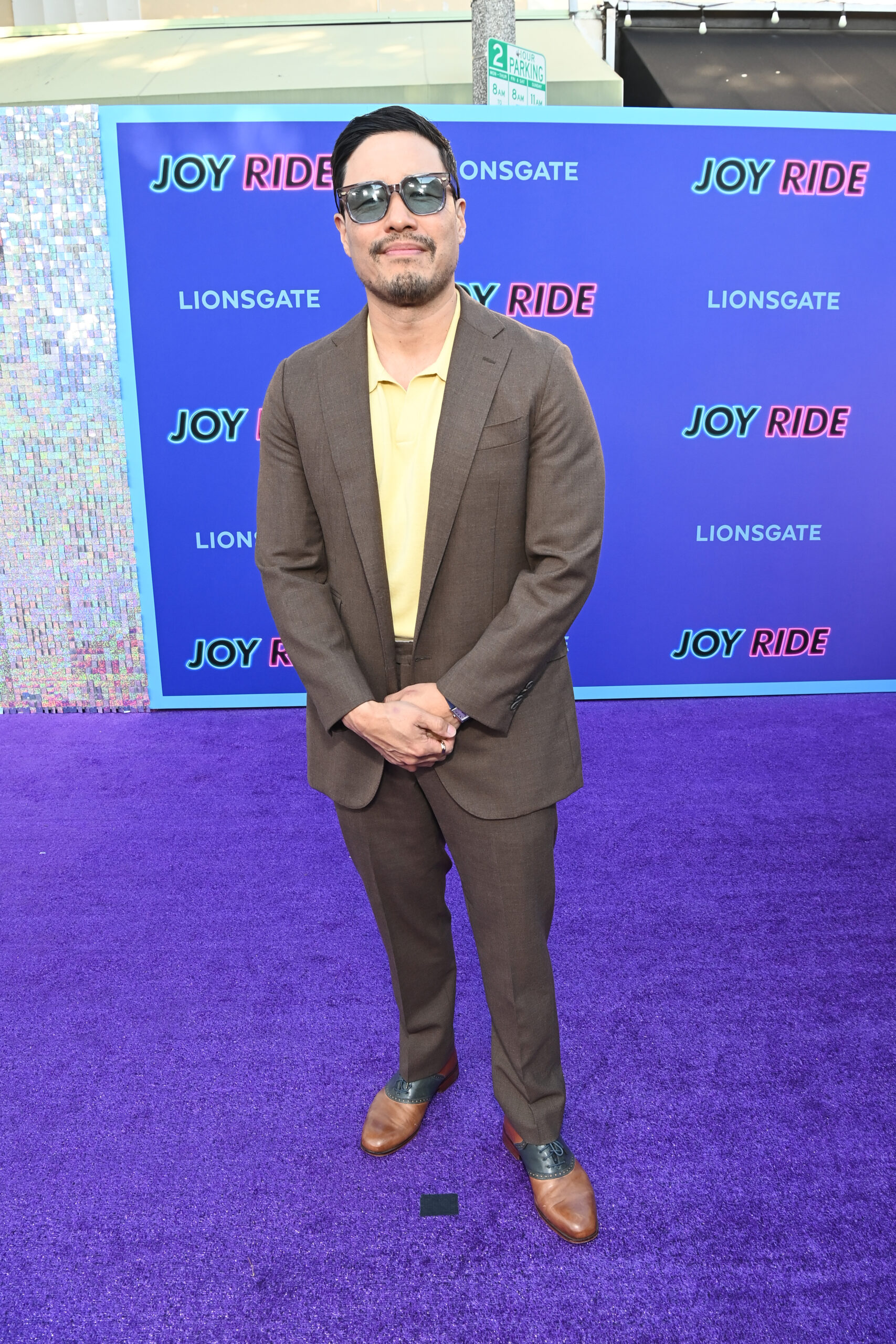
At this point, we don’t have to ask if Asian men can be hot. What we (i.e. the overall society) should start asking if Asian men’s humanity can be recognized and acknowledged. Let’s ask if we can get stories in which they are well-rounded individuals. Let’s ask for more Asian representation that shows what everyone should know–that Asian Americans are like anyone else, not some existential threat. If we could do that, then that would actually be hot.
